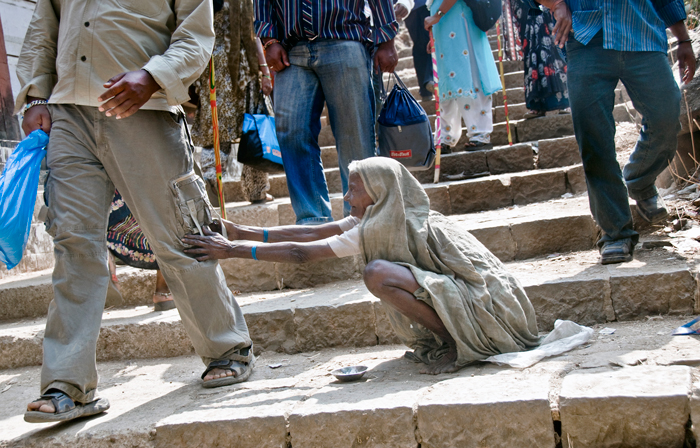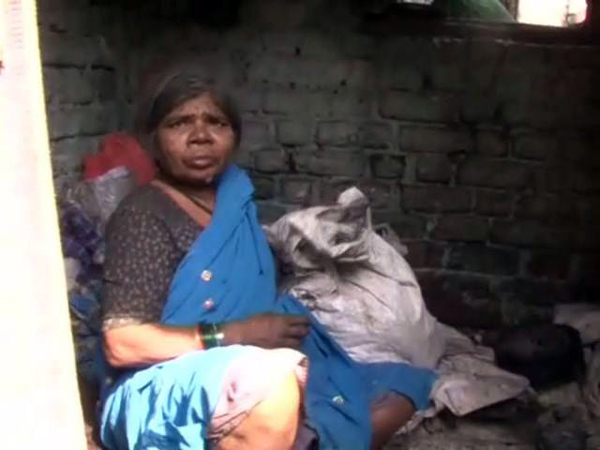What this incredible story of a beggar couple's 'riches' says about Mumbai

When a fire sent people rushing to Lahuji Nagar slum in Kalyan, about 50 km from Mumbai, on 13 December, they were in for a shock. Burning in a nondescript shanty were three bagfuls of money.
It was the "lifetime savings" of Mohammed Rahman and Fatima. The elderly couple are beggars.
Not surprisingly, the incident has put Mumbai's beggars in the spotlight.
Video: MP Minister Kusum Mehdele kicking a boy for begging
Raging fire
The couple have lived in the Mohane slum for over 70 years. They were barely known except to immediate neighbours and some fellow beggars.
Their shanty is just four walls of bricks loosely stacked up, with a bamboo mat for the door. The place reeks of the sewage that flows around the shanty.

Mohammed Rahman
Nobody, of course, knew about the "fortune" they hid inside. The couple did not even allow their daughter and son-in-law in.
How the fire started has still not been clearly explained. According to Fatima, their oil lamp fell down sometime in the wee hours and caused the fire. They started shouting for help.
"We heard the screams and noticed smoke rising from that house and we rushed there," said Santosh Nalawade, who stays a few shanties away and was among the first people on the scene.
"We started dousing the fire. But while everyone was busy taking out their belongings, Rahman and his wife seemed more worried about three gunny bags lying their shanty. The bags had also caught fire by the time we got them out."
2006 government estimate: 2,00,000 beggars in Mumbai and nearby areas, earning Rs 180 crore a year
When they opened the gunny bags, "everyone's eyes popped out". Out poured half-burnt currency notes of all denominations. The news of this "discovery" spread like wildfire and thousands of people, including the media, rushed to the slum.
Not just the three bags, it turned out the couple had "stashed currency notes and coins everywhere in their shanty", in earthen pots, glass bottles, even a water drum". "No surprise, they would guard the shanty more than their lives," said Nalawade.
Heated debate
Since the story was reported by the media, it has generated heated debate about the "begging industry" in Mumbai and adjoining areas. According to the Maharashtra government estimates, from 2006, the "begging business" in Mumbai is worth Rs 180 crore a year.

Fatima
However, researchers working with beggars say the estimate is quite low, even though it's difficult to arrive at a certain figure "given the nature of the beggars' population and the fact that a major part of the business is operated commercially".
Tariq Qureshi, the director of Tata Institute of Social Sciences' Koshish project "for the betterment of homeless and begging children", has been working with beggars for over 15 years now. "A majority of beggars in the city are children. There are syndicates running the begging industry in this metropolis. These syndicates force children into begging and exploit them," he said.
In 2006, the state government had pegged the population of beggars in the city at about 2,00,000, an increase of 20,000 since 1963. No such estimate has been made in the decade since.
"This is difficult to accept. If the population is 200,000 and the annual turnover is Rs 180 crore, then it comes to Rs 900 a month per person," Qureshi explained. "It is not possible for anyone to survive on Rs 900 per month in any city, let alone Mumbai."
No doubt, people beg by choice, not compulsion. But most are forced into begging: Tariq Qureshi, TISS
"The figures presented by the government need to be verified again as it takes a massive survey of at least five years to arrive at an estimate of the population of beggars in any city," he added.
According to Qureshi, the average daily earning of a beggar in Mumbai is "in the range of Rs 300-Rs 500 a day". "Even with this conservative estimate, the annual turnover of beggars in Mumbai would be way more than Rs 180 crore claimed by the state."
Sordid business
And the more money there is to make from the "business", the worse. "The existing infrastructure and anti-begging laws are not adequate to end begging and the ordeal of children and women forced into it," said Qureshi.
"No doubt, there are people who beg by choice and not by compulsion. Still, a majority of people are forced into begging. Also, not everyone earns a huge amount of money from begging as projected by some sections of the media."
The anti-begging laws, Qureshi further argued, "do not have any deterrence and and are full of ambiguities over the definition of a beggar".
Taking advantage of such loopholes, several "begging syndicates" have sprung up in Mumbai over the years, Qureshi said. "Most of the syndicates are controlled by the underworld," he claimed. "The beggars act as a source of earning as well as information about various developments in the city."
A retired officer of the Crime Branch claimed that a "majority of the women with children that you often seen begging on the city's streets rent those kids from their mothers." "There have been cases of housemaids renting the children of their employers to beg," the officer added.
"This whole begging business in Mumbai gets murkier the deeper you dig into it."
More in Catch - Angered at being denied Rs 100, beggar jumps with man in front of train



_251372_300x172.jpg)


![BJP's Kapil Mishra recreates Shankar Mahadevan’s ‘Breathless’ song to highlight Delhi pollution [WATCH] BJP's Kapil Mishra recreates Shankar Mahadevan’s ‘Breathless’ song to highlight Delhi pollution [WATCH]](http://images.catchnews.com/upload/2022/11/03/kapil-mishra_240884_300x172.png)

![Anupam Kher shares pictures of his toned body on 67th birthday [MUST SEE] Anupam Kher shares pictures of his toned body on 67th birthday [MUST SEE]](http://images.catchnews.com/upload/2022/03/07/Anupam_kher_231145_300x172.jpg)






